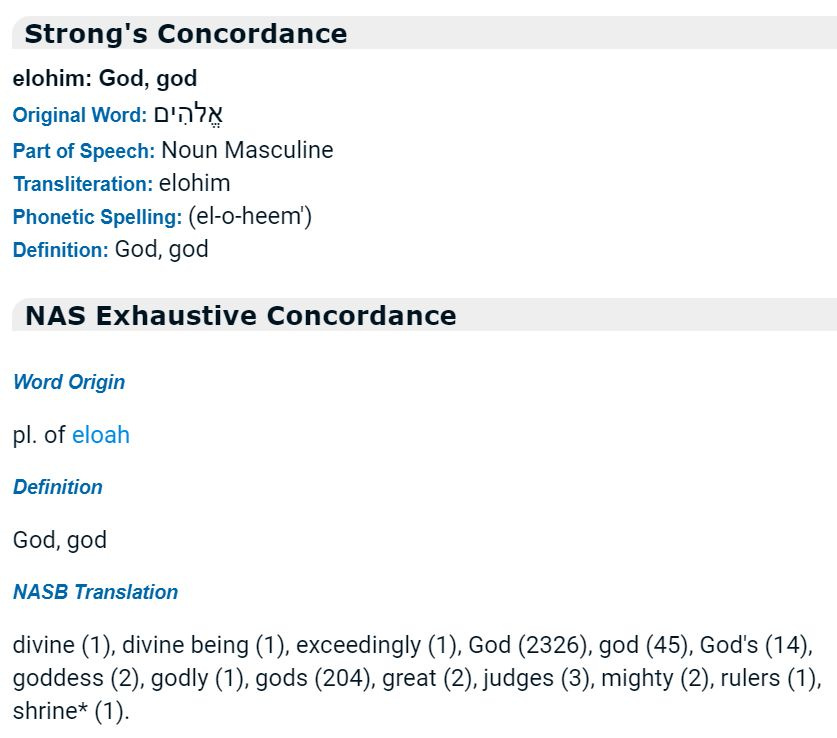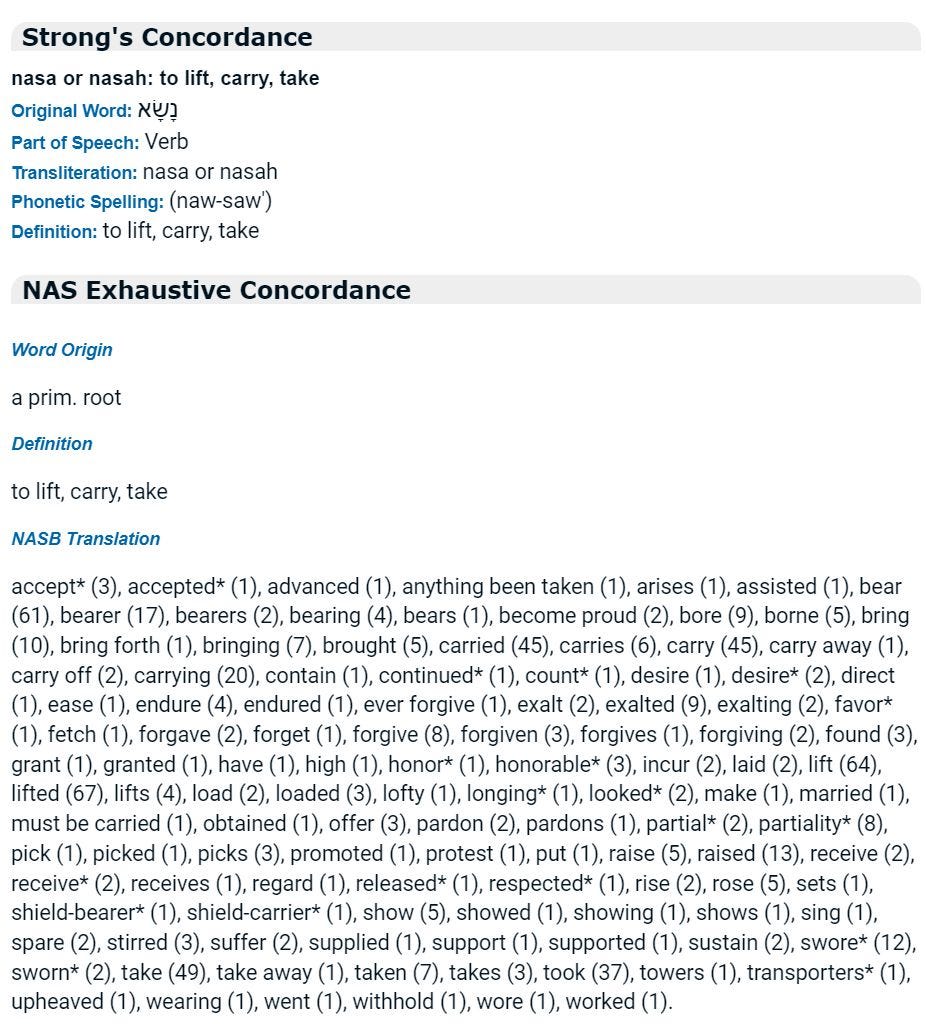On Taking the Lord's Name in Vain
And Bearing God's Name
It seems most Evangelicals think that “taking the Lord’s name in vain” is saying “God” or “Jesus Christ” in a disrespectful manner. I’m not here to say it doesn’t include that. But some things to ponder:
1: "God" isn't His name. YHWH is His name (and English translations of the Old Testament typically translate “YHWH” as “LORD”). The Hebrew word “elohim” can mean either “God” or “gods” (it is basically used in the Old Testament to refer to any being living in the spiritual realm) and - while the word “elohim” is certainly used repeatedly to refer to YHWH - the Old Testament is filled with references to “elohim” that are not YHWH.
“Now I know that the LORD [YHWH] is greater than all gods [elohim], because in this affair they dealt arrogantly with the people.” - Exodus 18:11
“The people of Israel again did what was evil in the sight of the LORD [YHWH]and served the Baals and the Ashtaroth, the gods of Syria, the gods [elohim] of Sidon, the gods [elohim] of Moab, the gods [elohim] of the Ammonites, and the gods [elohim] of the Philistines. And they forsook the LORD [YHWH] and did not serve him.” - Judges 10:6
“God [Elohim] has taken his place in the divine council; in the midst of the gods [elohim] he holds judgment… I said, “You are gods [elohim], sons of the Most High, all of you; nevertheless, like men you shall die, and fall like any prince.” Arise, O God [Elohim], judge the earth; for you shall inherit all the nations!”. - Psalm 82:1; 6-8
“You shall not worship the LORD [YHWH] your God [Elohim] in that way, for every abominable thing that the LORD [YHWH] hates they have done for their gods [elohim], for they even burn their sons and their daughters in the fire to their gods [elohim].” - Deuteronomy 12:31
That’s just a few examples of the Hebrew word for “god” or “God” being used for spirit world beings other than YHWH. There are many others (including, interestingly, the spirit of Samuel when he was called up by the medium/witch at Endor in 1 Samuel 28:13).
Again, “God” is NOT His name. It’s YHWH. And, of course, His son, Jesus Christ, is also “God”. But I don’t get that worked up about people saying, “Oh my god” - because “God” isn’t His name. Someone showing a lack of respect for the name of Jesus Christ is another matter, and as a follower of YHWH and Jesus Christ, it bothers me. But if they’re not a follower of YHWH and Jesus Christ, it’s not surprising. Because…
2: The commandment not to take the name of the Lord in vain is to followers of YHWH/Jesus Christ. It’s not to anyone else.
YHWH didn't get all worked up about followers of other gods using His name in vain. They served other gods.
It's hardly surprising that those who don't follow YHWH/Jesus don't show proper respect to His name. But the words they are saying are not their problem - it's a symptom of their problem. Specifically, that their loyalty lies elsewhere.
Whether it's Hollywood and media or whatever, our culture has moved away from YHWH/Jesus as the “Elohim” to which individuals' loyalty lies. The lack of respect for His name in modern culture is a result.
When those who claim to be YHWH's people misrepresent Him to the unbelievers, THAT is what really gets Him ticked.
3: The Hebrew word often translated "take" in the command not to take the Lord’s name in vain also means "lift" or "carry". It's translated "bear" 61 times, "lift" 64 times, “lifted” 67 times, and "take" 49 times in the NASB translation.
The command not to “take” the Lord’s name in vain is largely not about speech or saying a particular word/words.
The command appears to be primarily about BEARING the name well - i.e. representing YHWH as one's God accurately, just as the hand of the king would represent a king's interest accurately (which appears to be why Jesus saved most of His anger for religious leaders who were misrepresenting YHWH or "bearing" His name in vain). That could/would, of course, include using His name properly/not using His name improperly, but it's about far more than that.
Below are some passages showing usage of the Hebrew word outside the 10 Commandments. The word is usually associated with physical action, not merely speaking.
"So Aaron shall BEAR the names of the sons of Israel in the breastpiece of judgment on his heart, when he goes into the Holy Place, to bring them to regular remembrance before the LORD".
“If anyone sins, doing any of the things that by the LORD’s commandments ought not to be done, though he did not know it, then realizes his guilt, he shall BEAR his iniquity."
"But if anyone who is clean and is not on a journey fails to keep the Passover, that person shall be cut off from his people because he did not bring the LORD’s offering at its appointed time; that man shall BEAR his sin."
“Fill the men’s sacks with food, as much as they can CARRY, and put each man’s money in the mouth of his sack...".
"One day Jonathan the son of Saul said to the young man who CARRIED his armor...".
"Did I choose him out of all the tribes of Israel to be my priest, to go up to my altar, to burn incense, to WEAR an ephod before me?"
"The flood continued forty days on the earth. The waters increased and BORE up the ark, and it rose high above the earth."
"Cain said to the LORD, “My punishment is greater than I can BEAR."
"... the land could not SUPPORT both of them dwelling together...".
"Now then, TAKE your weapons, your quiver and your bow, and go out to the field and hunt game for me...".
"... they saw a caravan of Ishmaelites coming from Gilead, with their camels BEARING gum, balm, and myrrh, on their way to carry it down to Egypt."
"Then they LOADED their donkeys with their grain and departed."
"The sons of Israel CARRIED Jacob their father, their little ones, and their wives, in the wagons that Pharaoh had sent to CARRY him."
"Aaron will CARRY these names on his shoulders as a constant reminder whenever he goes before the LORD."
Here's 3 minutes of Dr. Michael S. Heiser discussing the issue - that humans were created to bear YHWH's image. To IMAGE YHWH accurately and actively here on earth. To be YHWH’s representatives on earth. It's very similar to an employee representing their employer/company well. Or a college athlete representing their university well on and off the field/court. And that's what "taking" the name appears to mean.
This is an excellent book on the subject by Carmen Imes:
Bearing God's Name: Why Sinai Still Matters
Now think about that in terms of “taking” the mark of the beast in Revelation.
It's hardly just about a mark on the skin - it's primarily about where people have placed their loyalty. It may not even be a physical mark, as Revelation is notoriously figurative and there are passages in Revelation saying that followers of YHWH will have the seal of God on their foreheads. People who preach and warn about "taking" the mark of the beast rarely mention the mark that believers have on their forehead in Revelation. I did a blog post on that here:
The Mark of the Beast... is it a "literal" tattoo or implant or the like?
If you find the material on this blog interesting, please subscribe here:



